

Being the creative and committed educators that we are, we will get it done. This quick guide will provide you with the tools necessary to be successful in your new and unexpected online course.
This process will provide you with an opportunity to conduct somewhat of an audit of your course, which serves everyone well.
Objectives are important. Module 3: Learning Objectives. Every program of instruction, course, or training activity begins with a goal.
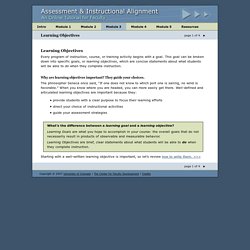
This goal can be broken down into specific goals, or learning objectives, which are concise statements about what students will be able to do when they complete instruction. Why are learning objectives important? They guide your choices. Align Assessments, Objectives, Instructional Strategies - Eberly Center. Assessments should reveal how well students have learned what we want them to learn while instruction ensures that they learn it.
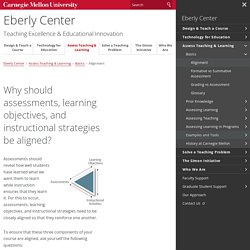
For this to occur, assessments, learning objectives, and instructional strategies need to be closely aligned so that they reinforce one another. To ensure that these three components of your course are aligned, ask yourself the following questions: Learning objectives: What do I want students to know how to do when they leave this course? Assessments: What kinds of tasks will reveal whether students have achieved the learning objectives I have identified? Course Materials. Choosing Course Content - UCAT. For many instructors, it is tempting to plan a course by picking a textbook and readings to focus on during the course, and then to identify the topics for the course from those readings.
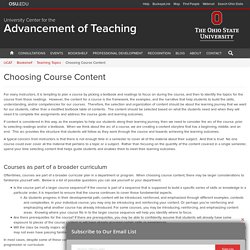
However, the content for a course is the framework, the examples, and the narrative that help students to build the skills, understanding, and/or competencies for our courses. Therefore, the selection and organization of content should be about the learning journey that we want for our students, rather than a modified textbook table of contents. The content should be selected based on what the students need and when they will need it to complete the assignments and address the course goals and learning outcomes.
Planning & Selecting Course Content. Selecting Content for Your Online Course. The materials you select will make up a large portion of your course.
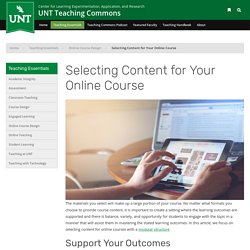
No matter what formats you choose to provide course content, it is important to create a setting where the learning outcomes are supported and there is balance, variety, and opportunity for students to engage with the topic in a manner that will assist them in mastering the stated learning outcomes. In this article, we focus on selecting content for online courses with a modular structure. Activities. Online Learning Activities - Introduction to Teaching Online. The structure of the weekly content will often be defined by the topics in your face-to-face course.
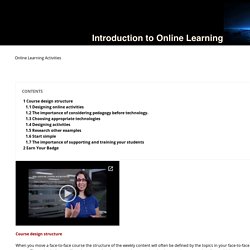
The main challenge will not be structuring the content but ensuring that learners have enough online activities. Structure the course as weeks following the topics. This provides a clear timetable. Problem-based learning also allows for learners to have weekly activities. The best activities to include in your online course. To recap: So what types of activities do you include?
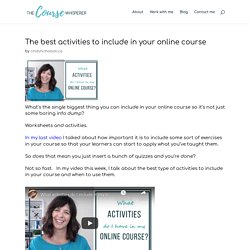
It depends….. (you didn’t think it would be that easy did you?) So, what does it depend on? First it depends on what you’re teaching in the lesson. Instructional Strategies for Online Courses – ION Professional eLearning Programs - University of Illinois Springfield - UIS. Effective online instruction depends on learning experiences that are appropriately designed and facilitated by knowledgeable educators.
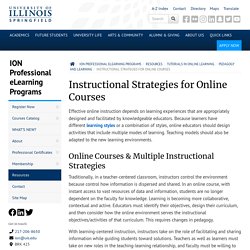
Because learners have different learning styles or a combination of styles, online educators should design activities that include multiple modes of learning. Teaching models should also be adapted to the new learning environments. Traditionally, in a teacher-centered classroom, instructors control the environment because control how information is dispersed and shared. In an online course, with instant access to vast resources of data and information, students are no longer dependent on the faculty for knowledge.
Learning is becoming more collaborative, contextual and active. With learning-centered instruction, instructors take on the role of facilitating and sharing information while guiding students toward solutions. Assessments. Module 1: Learning Assessment & Alignment. This overview of assessment and alignment will help you understand the framework presented in the next module.
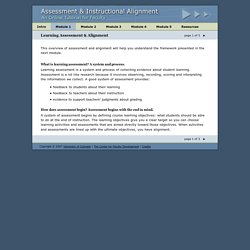
What is learning assessment? A system and process. Learning assessment is a system and process of collecting evidence about student learning. Assessment is a lot like research because it involves observing, recording, scoring and interpreting the information we collect. Johns Hopkins University Engineering for Professionals. Defining Assessment A question often asked by faculty developing an online course for the first time is, How will I know that my online students are learning if I can't see them?
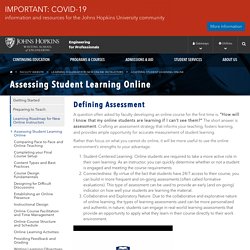
The short answer is assessment. Q&A: Strategies for better assessments in online learning. Does anyone really know the definition of a "good" assessment?
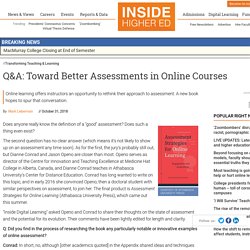
Does such a thing even exist? The second question has no clear answer (which means it's not likely to show up on an assessment any time soon). As for the first, the jury's probably still out, but Dianne Conrad and Jason Openo are closer than most. Openo serves as director of the Centre for Innovation and Teaching Excellence at Medicine Hat College in Alberta, Canada, and Dianne Conrad teaches in Athabasca University's Center for Distance Education. Learner Assessment in Online Courses: Best Practices & More. Selecting assessment activities is a powerful way to achieve learning outcomes and to assure course completion. It determines the degree to which each of our goals has been reached-hence the degree to which your course is successful and valuable. How should someone design assessments in online learning?
Good course design that aligns competencies with outcomes is critical. Therefore, if you’ve kept in mind the fundamental questions “What do I want my students learn to do?” And “How will they show their skills, attitudes, and abilities”? Speaking about online courses, most instructors provide a final quiz at the end of their course and a passing score accompanied by a certificate. Online Teaching - LX Pathways.
The Online Instructor Pathway is comprised of five core competencies that are aligned to relevant content, practice activities, and self-assessments. The competencies are based on the community of inquiry (CoI) model. The CoI model is Upon completion of all five competencies, iDesign will award you a Fundamentals of Online Teaching Track Completion Badge, which you can use to enhance your résumé, CV, or professional web presence. A community of inquiry is a “group of individuals who collaboratively engage in purposeful critical discourse and reflection to construct personal meaning and confirm mutual understanding” (Garrison, D.
R., Anderson, T., & Archer, W. 2000). Tips - Transitioning to Remote Instruction. C.V. – Rebecca Barrett-Fox. Assistant Professor of Sociology Arkansas State University, PO Box 2410, State University, Arkansas 72467 (870) 972-3262 / rbarrettfox@astate.edu / anygoodthing.com Ph.D. in American Studies (with honors), University of Kansas M.A. in American Studies, University of Kansas B.A. in English & Human Studies (summa cum laude), Juniata College, Huntingdon, PA God Hates: Westboro Baptist Church, American Nationalism, and the Religious Right. University Press of Kansas, 2016. Guest Editor, Journal of Hate Studies, “Hate and Heritage” Special Issue. Tiny Tips #1: COVID-19 and Online Learning – George Veletsianos, PhD. The kind of online learning that many of us aspire to requires careful thought and planning. But what do you do when you don’t have time to carefully orchestrate a well-crafted online learning experience, such as when COVID-19 requires you to abruptly abandon your in-person teaching and switch to an online solution?
Here’s a few tiny tips: Recognize that you are now in a new environment. You’ll find yourself wanting to replicate your face-to-face course. That’s a losing battle. Preparing for just-in-time remote teaching/learning – Jonathan D. Becker, J.D., Ph.D. [NOTE: Face-to-face classes at VCU have not been canceled (yet!) ; the guidance we have received so far is to prepare for a move to distance education. So, this morning, I sent an email to all of my colleagues in the School of Education. It doesn’t cover everything I wanted to say, but I didn’t want to overwhelm people… (also, the subject line of the email referenced is the same as the title of this post.
UPDATE (0312/20) – f2f classes cancelled for at least two weeks]